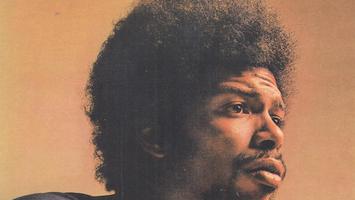Whiteness is practiced, not as a privilege, but rather a deputization.
“The primary reality of an oppressive system is its military reality.”
San Francisco had its prison walls all picked out; prepared to unveil its latest awkward interpretation of imperialism. Two police officers exit a squad car.
The United States power structure does not dialogue with us, it dialogues with our potential for resistance. And we receive the red and blue lights of its spokespeople as best as our political, spiritual, and psychic commitments permit.
The first time I was frisked by police, it was alongside my younger brother. I was an especially thin wrist’d nine. He was seven. I have been enjoying my poetry being proven right ever since.
What this present moment, and what the past few centuries all teach us is that the primary reality of an oppressive system is its military reality. Before the determination of economics, institutions of socialization, and culture, there is a foundation of violence (organized, monopolized, and sponsored). An empire has to slaughter people in order to set up shop and enforce cultural hegemony. A slave owner is not someone who does not pay people for their work, as much as they are someone who will maim or kill people if they do not work (let alone, yet especially, revolt). And this equation continues into this modern era with hyper militarization of police, mass internment of Brown and Black people, permanent imperialist invasions around the world, and masses who practice whiteness (as it was designed by past U.S. ruling classes), not as a privilege, but rather a deputization.
“A slave owner is not someone who does not pay people for their work, as much as they are someone who will maim or kill people if they do not work.”
In the United States, or really as a hallmark for all imperialist projects past and present, the foot soldier of the empire, both those literally sworn in and trained or those who just live regular corporation-determined lives on the various postindustrial, service economy roads to nowhere, stewing in confusion—for all foot soldiers, practicing violence is the only way that they can prove to themselves that they actually exist. This identity both extends and is extended by the deep feeling that war is the only way that they can be sure that their country exists.
This is where we enter daily as poets. And it is with respect to this reality that we must intervene.
Poetry (or art of any discipline) exists in the same part of the mind that produces revolutionary intention. Somewhere among flickers of stray phenomenal constructs are the stray building blocks of praxis asking to be gathered, expanded, and clarified by study and practice. Poetry is every step of the way from idea to practice. Our revolutionary (or counterrevolutionary) praxis and our art subtitle each other. Both evolve or atrophy together.
We garden praxis with critical conversation and vigilant (though ideally gentle) upkeep of detail and nuance.
“War is the only way that they can be sure that their country exists.”
In that biosphere of phenomenal engagement, we nurture, restore or postpone our humanity.
Poetry is a play on perception. It is the opportunity to see what your mind can do moment to moment; specifically, what your mind’s capacity for and use of language can manufacture when you don’t have to follow the bounds of physical and/or social reproduction. This perception, as catalyzed by the opportunity for de-crystallizing hegemonic identity, is where liberation begins.
What is the reality of power in the United States?
At nine years old, under duress and with an interrupted sugar high, the mapping of my repression was violent and ceremonial; especially ceremonial, was my mandate not to fold to these occupying troops. I remember their military-aided body language. I was engaged by the system as a have-not, but this was not a dream of the wallet. This was not a matter of privilege. This was a protein of the true nature of contradiction in the United States: that of violence.
I wonder if it is a rite of passage for a police officer to detain a non-white child.
Poetry occupies the strangest place in reality. A convergence of paradoxes where reality can simultaneously only be perceived and only be produced; where one line is both a universe unto itself and at the same time completely devoid of any individual register or self-contained existence; where there is only evidence and simultaneously no evidence of a creator. All proof of the fact that the system is not immortal nor invincible, but rather the aggregate of coercion and consent.
“I remember their military-aided body language.”
Poetry is the half step between the realms of cosmic unity and one million dualities. The poet creates an image by pulling these realms towards each other. A process of healthy insanity or within an insanity free of self-absorption. The poet creates an image by relaxing into the emotive math of language. In poetry, there is no ideal state. In poetry, there is no ideal style. There is no ideal reader. There is no ideal audience. There is only a torrential continuum of language through which we chase liberation. All proof that any poet (regardless of their respective talents and obsessions) can become a revolutionary.
How do we define a poet’s power in the United States?
Armies water themselves with children; therefore, a poet must have a revolutionary praxis. Armies water themselves in your mother’s living room; therefore, a poet is only either a tool of the oppressor or tool of the oppressed.
What is a busy Saturday sidewalk of bystanders in the United States?
Police searched skinny children for weapons and the crowd did not intervene. They stopped. They gawked. They reasoned with their hegemony-ridden internal compasses. They mostly kept walking. They mostly ganged up against God.
Which poet are you in the preceding scene?
I wonder if I am too severe or if the individual beliefs of a person not immersed in a revolutionary praxis are no more than phrases etched onto a horse bit.
The police left us on the street to digest the theatre of whiteness we just survived. Their military strut had no instrumental beyond my nine-year-old heart rate. Their metronome versus mine. Bystanders moved along without any consequences for their U.S. induction. We were all participating now in history.
Two boys meet imperialism.
Tongo Eisen-Martin was born in San Francisco and earned his MA at Columbia University. He is the aAuthor of “someone’s dead already” (Bootstrap Press, 2015), nominated for a California Book Award; and Heaven Is All Goodbyes (City Lights, 2017), which received a 2018 American Book Award, a 2018 California Book Award, was named a 2018 National California Booksellers Association Poetry Book of the Year, and was shortlisted for the 2018 Griffin International Poetry Prize.
He is also an educator and organizer whose work centers on issues of mass incarceration, extrajudicial killings of Black people, and human rights. He has taught at detention centers around the country and at the Institute for Research in African-American Studies at Columbia University. He lives in San Francisco.
This article previously appeared in Poetry Foundation.
COMMENTS?
Please join the conversation on Black Agenda Report's Facebook page at http://facebook.com/blackagendareport
Or, you can comment by emailing us at comments@blackagendareport.com


















